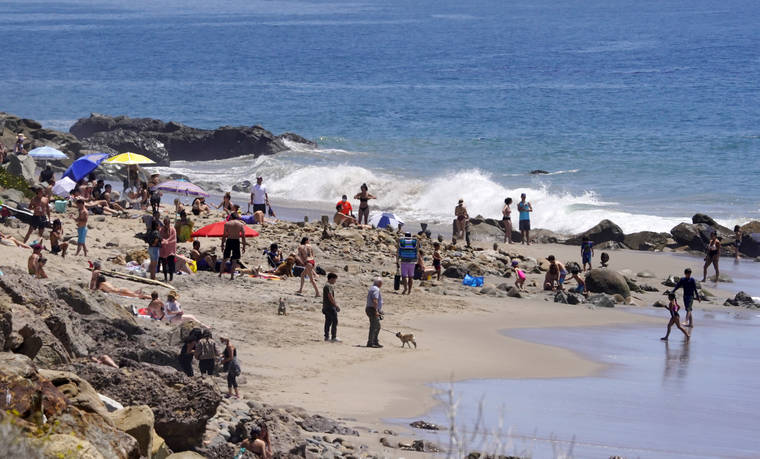LOS ANGELES — Californians will be tempted to hit beaches, golf courses and trails in the midst of a spring heat wave this weekend but authorities warned people not to swarm them for fear of igniting a deadly coronavirus surge.
The forecast calls for temperatures in the 80s and 90s in many areas from Sacramento to San Diego and while most recreation remains shuttered under various stay-at-home orders, officials are wary that those still open could draw crowds that will ignore social distancing rules and seek sun and air after being mainly confined indoors for more than a month.
Los Angeles city and county beaches, trails and playgrounds were closed and the LAPD’s mounted platoon were patrolling those areas Saturday to enforce social distancing rules. The city also opened cooling centers for people “who might not be able to survive the heat wave at home,” Mayor Eric Garcetti said.
Everyone else should stay home rather than gathering outside, he pleaded.
Otherwise, “more people will be sick, and more will die,” he said, which could delay the city’s reopening because any spikes in virus cases could show up weeks later.
California has more than 41,000 coronavirus cases and more than 1,600 deaths, half of them in the Los Angeles area, according to data compiled by Johns Hopkins University. However, the number of infections is thought to be far higher because many people have not been tested, and studies suggest people can be infected with the virus without feeling sick.
For most people, the virus causes mild or moderate symptoms, such as fever and cough that clear up in two to three weeks. For some, especially older adults and people with existing health problems, it can cause more severe illness and death.
Cases continue to grow in California but at a manageable pace that hasn’t overwhelmed hospitals, health authorities have said. State and local stay-at-home orders have been cited as successfully slowing the rise in coronavirus hospitalizations and deaths and recent polls show Californians overwhelmingly support them.
But there have been several protests by people who want to reopen the state, contending their liberty and livelihoods are at stake.
In San Francisco’s Bay Area, Santa Cruz shores reopened last week. On Friday, Claire Chislett and her family went to Davenport on the North Coast.
“Beaches, if you have an area to yourself and it’s 6 feet apart, then I think they should be open. People need to get out because they’re going to go crazy being at home,” Chislett told KPIX-TV.
Her mother Jennifer, a nurse, said it all depended on whether people were following the safety rules.
“If people are being appropriate — wearing their masks and keeping their distance — maybe we’ll take a little stroll on the beach,” she said. “I’m not sure I would camp out for the day.”
South of Los Angeles in Orange County, some cities allowed people to walk or wade along several miles of beaches. An estimated 40,000 people hit Newport Beach on Friday but most appeared to be avoiding close contact or crowded clustering, lifeguards said.
The city of Laguna Beach closed its beaches but a neighboring county beach was open and city Mayor Bob Whalen was concerned that out-of-towners might spill over.
“Stay at home,” he pleaded. “Please don’t overwhelm us here.”
Police warned that violators could face misdemeanor citations that carry fines of up to $1,000.
Beaches in Ventura County, northwest of LA, were open but with some restrictions.
“Basically, you must keep moving. No sunbathing, chairs, blankets, coolers, sunshade umbrellas,” a county statement said Friday. “You must keep moving (while) walking, running, surfing and swimming.”
There already have been large crowds and more people were anticipated, especially from neighboring LA County, but if they ignore restrictions the beaches could be shut down “for the foreseeable future,” said Mark Sandoval, director of the county Harbor Department.
San Diego County officials said beaches will reopen Monday to swimming, surfing, paddleboarding and kayaking, but not recreational boating. Strict social distancing rules still apply, meaning beachgoers cannot sit, lie down or engage in group activities.
Beaches operated by the state remain closed.
Some places were still tightening their social distancing rules.
On Friday, the city of San Jose announced it was barring people from using playgrounds, sports areas and exercise equipment at local parks.
Solano County extended its shelter-at-home order through May 17 and San Francisco Mayor London Breed said it was likely the order in her city would be extended by several weeks.
Concerts, sporting events and other events that draw large crowds have been among the casualties of the virus pandemic. On Friday, officials announced they were canceling the annual California State Fair in Sacramento for the first time since World War II. The event was to have taken place in July.


